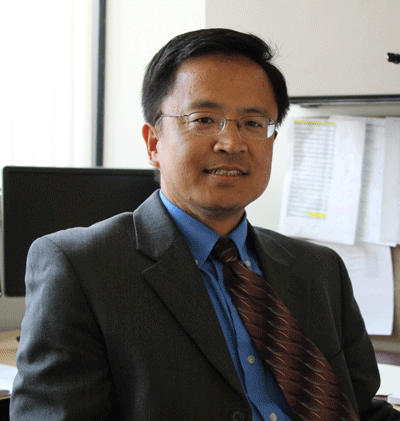The National Endowment for the Arts has awarded a research grant to the UMass MIND program to investigate virtual drama therapy for people recovering from serious mental illness. UMass MIND, the community intervention initiative of the Psychotic Disorders Clinical and Research Program of the Department of Psychiatry, will collaborate with the Drama Therapy Department at Lesley University to develop, implement and assess a novel treatment in a population that often does not respond to conventional treatment.

“Many living with mental illnesses struggle with verbal expression, which is required for effective engagement in talk therapy,” said Xiaoduo Fan, MD, MPH, professor of psychiatry and director of the Psychotic Disorders Program, and principal investigator for the three-year, $95,000 grant. “Through our collaboration with Lesley University, we will explore drama therapy as an embodied, nonverbal, novel adjunct treatment method, addressing the limitations of traditional therapies.”
“This award coincides with the 10th anniversary of the NEA research grants program,” said Sunil Iyengar, director of research and analysis for the NEA. “The National Endowment for the Arts is proud to support this project from UMass Medical School that, in a very challenging year, will investigate the value and impact of the arts.”
The project will enroll 96 participants into a randomized, controlled research study of multiple drama therapy groups using the Co-Active Therapeutic Theater Manualized Model. The model was developed by Laura Wood, PhD, associate professor of drama therapy at Lesley University.
The National Endowment for the Arts Research Grants in the Arts Program funds research that investigates the value and impact of the arts. The interdisciplinary and cross-sector collaborations between UMass MIND and community partners and stakeholders align with the endowment’s aim to explore outcomes of arts participation related to social and emotional well-being, creativity, cognition, learning, physiological processes of health, and healing and societal benefits.
“The drama therapy program offers our members an opportunity to enhance the clinical, social and vocational interventions available to them,” said Lisa Brennan, executive director of Genesis Club of Worcester, part of the Clubhouse International network providing support for adults with serious mental illness. “Our members who participated in a pilot for the project expressed how powerful it was to tell their stories through performance art, and how much it meant for family members and members of the public to see and hear their experiences.”
Dr. Fan and colleagues published a preliminary study in Schizophrenia Research on drama therapy in patients with serious mental illness and co-occurring substance use disorder.
“This type of group therapy inspires mindfulness and creativity. It provides a choice to be sincere and act out true feelings,” said Roberto Silva, a member of the UMass MIND Consumer Advisory Board, which comprises individuals who have lived experience with mental illness. “It’s a chance for me to express myself sincerely and get good reactions from my peers, with fewer repercussions than other treatments.”
Despite advances in the field of psychiatry, conventional treatments for mental illness, such as medication and psychotherapy, carry significant limitations, according to Fan. For example, long-term antipsychotic medication treatment is associated with an increased risk for obesity, diabetes and cardiovascular disease. But many living with mental illnesses struggle with verbal expression, which is required for effective engagement in talk therapy, due to cognitive impairment or unbearable emotional pain when talking about their life experience.
“We are proud to be recognized by the National Endowment of the Arts for our effort in developing novel, nonverbal type psychosocial interventions,” said Fan. “It is our hope that the expressive component of drama therapy will inspire participants’ innate creative capacities, combating stigma through celebrating their talents and resilience.”
Related story on UMassMed News:
Xiaoduo Fan appointed to PCORI advisory panel on health care delivery and disparities research